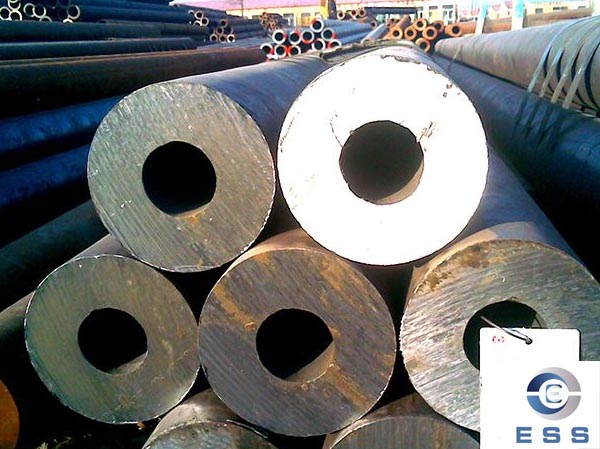1. Dimensional stability. For high-precision seamless steel pipes, the required precision is high, so it is necessary to maintain dimensional stability. Due to the straightening in the air, the cooling speed is slow, so it has a stabilizing effect on the austenite. It will increase the number of retained austenite in the structure, so cold treatment is performed.

2. Reduce quenching deformation. Because the
ms seamless pipes is slender, it is easy to deform during the quenching process, so it is necessary to strictly control its deformation. Heat treatment is a very critical process. In the process of quenching and cooling, the plasticity of the supercooled austenite is used for Timely straightening is a key step to ensure that its pass rate is improved. For this reason, hot bath quenching or cooling in oil for a certain period of time should be carried out to propose hot calibration.
straight.
3. High hardness. The
seamless steel pipe mainly bears the contact fatigue load, so it has high hardness, so it should be quenched or surface quenched or chemical heat treatment, etc., followed by low temperature tempering.
In order to safely cut thick-walled seamless steel pipes, the following operations are recommended.
1. Mechanical cutting adopts external installation and internal installation. It adopts the principle of turning tool to cut and bevel the nozzle. The single machine has a large span, can process a large thickness, and has less waste. The processing process does not generate high temperature and does not affect Pipe material, conducive to welding. Water cutting processes the pipeline through the combined action of high-pressure pump and emery. The incision is clean and the processing span is large, but its efficiency is low and the processing thickness is severely limited.
2. Oxygen C2H2 flame cutting, by adjusting the oxygen valve [gate and C2H2 valve, the mixing ratio of oxygen and C2H2 can be changed to obtain three different flames: neutral flame, oxidizing flame and carbonization flame.
3. Ion cutting, plasma cutting with different working gases can cut various metals that are difficult to cut by oxygen cutting, especially for non-ferrous metals (stainless steel, aluminum, copper, titanium, nickel), the cutting effect is better: its main advantage is the cutting thickness When the metal is not large, the plasma cutting speed is fast, especially when cutting ordinary carbon steel sheets, the speed can reach 5~6 times that of the oxygen cutting method, the cutting surface is smooth, the thermal deformation is small, and the heat affected zone is less.













 Eastern Steel Manufacturing Co.,Ltd not only improve product production and sales services, but also provide additional value-added services. As long as you need, we can complete your specific needs together.
Eastern Steel Manufacturing Co.,Ltd not only improve product production and sales services, but also provide additional value-added services. As long as you need, we can complete your specific needs together.










